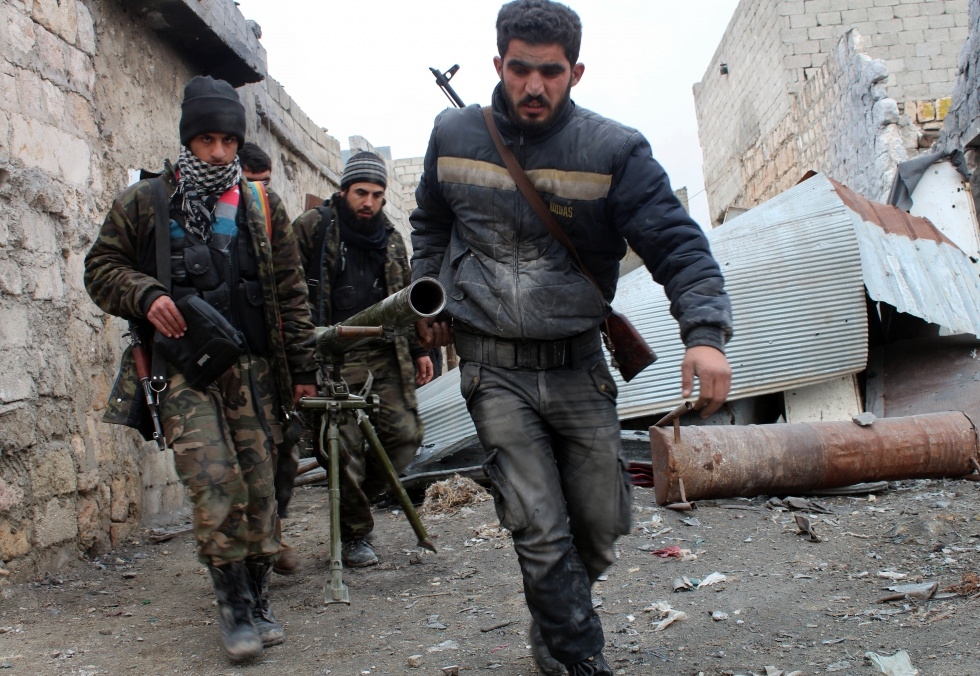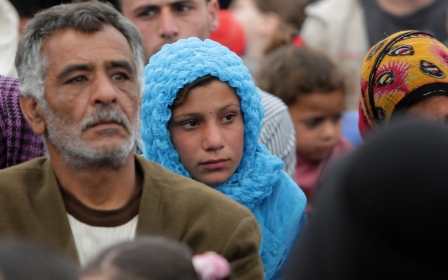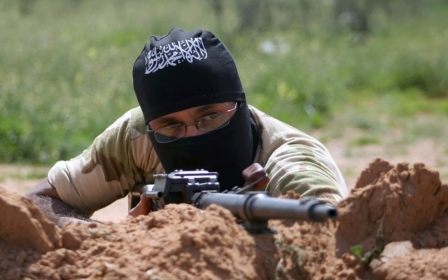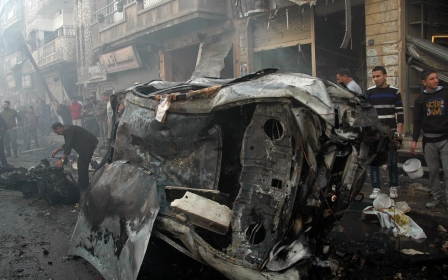Syria army makes advances near Damascus, Aleppo’s water supply hit

The Syrian army made major advances southeast of the capital Damascus on Sunday, as government aerial bombardment reportedly knocked out water supply in Aleppo and negotiations for the surrender of rebel-held Homs allegedly entered the final stages.
According to Syrian security sources quoted by AFP, Syrian army troops have now seized a significant party of Mleiha, a town strategically located near the airport road.
"More than half of the town is under army control," the official told AFP, speaking on condition of anonymity.
"The army has reached the town hall building. All the orchards and roads leading to the town are now in the army's hands, as is the south, the west and the southeast," he added.
The Syrian Observatory for Human Rights also reported the advance, but the head of the monitoring group said it was unclear how firmly in control the army was.
New MEE newsletter: Jerusalem Dispatch
Sign up to get the latest insights and analysis on Israel-Palestine, alongside Turkey Unpacked and other MEE newsletters
Observatory director Rami Abdel Rahman said, "Regime troops have reached the town centre. Hezbollah is playing the lead role in the battle."
The town is said to have been under siege for over a year and to have experienced heavy bombardment in the last several weeks.
The assault is the latest in a line of government-led offensives that have seen government forces make gains against rebel fighters in the south, west and north of the country.
Homs talks enters last phase
Syria’s second city Aleppo and the central city of Homs, once regarded as the heart of the revolution, have seen some of the fiercest fighting.
On Saturday afternoon Aleppo, which has been targeted by a deadly aerial bombardment campaign, allegedly came under fresh government strikes that cut off the city’s main water supply, Turkish Anadoulu agency reported.
YouTube videos of seemingly flooded Aleppo streets posted by opposition activists quickly appeared online after the incident. This is not the first time that the Assad forces have been accused of cutting off water supplies to rebel held areas, including Aleppo, and water has been used as a tool of war in the bloody civil war in which more than 150,000 have been killed and millions displaced.
Meanwhile in Homs, where pockets of opposition fighters have resisted a government siege, the two sides seemed to edge close to a deal which would see rebel fighters withdraw from the last remaining strongholds.
Talks now appear to be entering the final stage of negotiations after a 48-hour truce was agreed on Friday, according to Governor Talal al-Barazi and rebel representative and negotiator Abul Harith al-Khalidi.
"Talks to rid the city of arms and of armed men... are ongoing and we are near the end," Barazi told AFP.
Barazi said the deal "will be applied first in the Old City, then in Waer. The goal is to reach a peaceful solution that brings back security and government institutions."
Abul Harith said the talks are being held in tandem with negotiations to free a group of pro-regime Iranian officers held by rebels in the northern city of Aleppo.
Such a deal, which would include guarantees of safe passage for the Homs fighters, "is a way to put pressure on the regime," he said, adding that all rebel groups, including the Al-Qaeda-affiliated Al-Nusra Front, had given him permission to negotiate the pullout.
"We want to stop this bloodbath," he said.
Earlier, Barazi had said Al-Nusra opposed the truce.
60,000 displaced as ISIL clashes with Al-Nusra
The uprising against Assad’s rule first began in 2011 and quickly escalated. While the conflict first appeared to be a largely domestic affair, various international players and factions have since complicated the dynamics of the war.
The Lebanese Shiite movement Hezbollah has sent thousands of fighters into Syria to back Assad's regime and has been widely credited with helping Assad make progress near Damascus, Homs in central Syria and Aleppo in the north.
The country has also become a hotbed for other opposition groups, such as the Al-Nusra Front, the Al-Qaeda franchise in Syria.
While it has at various times both allied and clashed with more moderate fighters, the group reportedly seized a moderate rebel commander in the southern province of Daraa.
"Al-Nusra Front last night arrested the head of the Military Council of Daraa, Captain Ahmad Naameh, along with five other commanders of opposition factions," said the Syrian Observatory for Human Rights.
Activists also reported his capture, which took place amid significant rebel advances in the province, where Al-Nusra Front has only a limited presence.
Activists believe that the attack occurred in response to controversial anti-jihadist statements made by Naameh in Jordan last week, although the incident could have been also been sparked by internal power clashes within the opposition.
In a video recorded this week, distributed by the Observatory, Naameh said: "Who is going to rule Syria? Not the extremists... who behead people... No, it will be the Free Syrian Army, which is well organised, and which believes in democracy, democratic rule and the civil state."
Over the weekend, Al-Nusra also clashed with rival jihadist group ISIL, which is seen as even more extreme and has recently been linked to several crucifixions, which were exposed by CNN.
The fighting reportedly displaced some 60,000 people who fled towns in the eastern Deir Ezzor province where extreme opposition elements still have a strong hold.
According to the Observatory: "Residents of the towns of Busayra, home to 35,000 people, Abriha, home to 12,000 people, and Al-Zir, home to 15,000 people, have nearly all been displaced by the fighting in the area."
Middle East Eye delivers independent and unrivalled coverage and analysis of the Middle East, North Africa and beyond. To learn more about republishing this content and the associated fees, please fill out this form. More about MEE can be found here.




